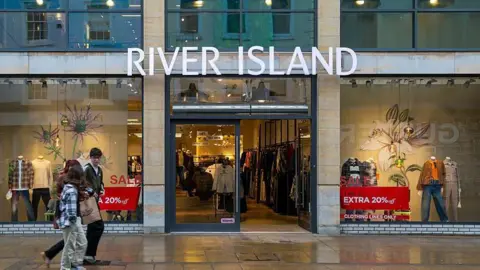**River Island to Close 33 Stores: A Significant Shift in Retail**
In a striking development impacting the UK retail landscape, River Island, a prominent clothing retailer, has announced plans to shutter 33 of its stores across the country, a decision that places hundreds of jobs at risk. This move has raised eyebrows not just among retail analysts but also within communities where these stores are staples of high street shopping. As the family-owned retailer grapples with changing consumer behaviors and increasing operational costs, its future remains uncertain.
The driving factors behind this decision primarily include the surge in online shopping and the heightened costs associated with maintaining brick-and-mortar locations. River Island has attributed these challenges to broader trends within the retail sector, revealing that it is reinventing itself to align more closely with modern consumer expectations. Currently operating 230 stores and employing approximately 5,500 individuals, the company has experienced significant financial strains that compelled it to reconsider its strategic direction.
Ben Lewis, the chief executive of River Island, articulated the retailer’s predicament in a recent statement. He acknowledged River Island’s status as a cherished high street name but pointed out that the current retail environment necessitates change. The retailer faces a “large portfolio of stores that is no longer aligned to our customers’ needs,” a reflection of the turbulent market changes that have accelerated over the last few years.
In conjunction with the proposed store closures, River Island is seeking rent reductions from landlords on an additional 71 locations deemed unsustainable in their current form. This effort underscores the pressure retailers face as consumers increasingly favor the convenience of online shopping over traditional in-store experiences—an evolution that has reshaped the retail sector significantly.
From a financial perspective, the situation is quite dire for River Island, evidenced by its reported loss of £33.2 million in 2023, coupled with a stark 19% decline in sales according to the latest financial records. The company has expressed its intentions to undergo a comprehensive turnaround strategy, which includes necessary restructuring measures. Despite the looming store closures, Lewis has assured that the company will strive to limit job losses and is committed to consulting with affected employees to explore potential redeployment opportunities.
Notably, it has been clarified that the planned store closures will not impact the staff at the head office, which is a small relief amid the uncertainty surrounding the retail positions at the local store level. Employees of the affected stores will be consulted as the process advances, indicating that the company is attempting to manage transitions as smoothly as possible, even as it grapples with tough decisions.
The timeline for these changes is moving swiftly, with creditors slated to vote on the closure plans beginning August 4th, while a court will have the final say on approval by August 7th. This expedited timeline points to the urgency River Island feels as it navigates its future amidst an evolving retail environment.
River Island’s roots trace back to 1948 when it was founded as part of the Lewis family and originally operated under the Chelsea Girl brand. The transition in naming during the 1980s marked the beginning of its broader market presence, solidifying its place in the high street fashion landscape over subsequent decades.
As River Island stands at a crossroads, the company’s next steps will be critical in determining its viability as both an employer and a retail brand. The move to close stores reflects a broader narrative in retail, where adaptability and responsiveness to market forces are essential for survival in an age where shopping paradigms are shifting, and operational costs continue to rise.



